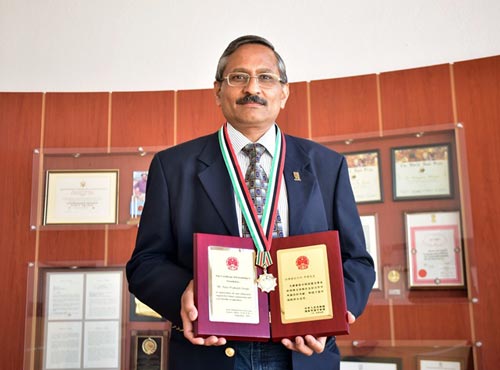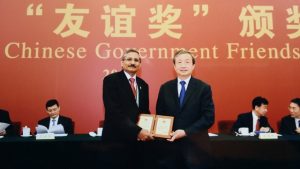 EL BATAN, Mexico (CIMMYT) – Gains in China’s agricultural productivity over the past 30 years are due in large measure to smallholder farmers who have readily adopted innovative farming practices introduced by scientists, said a top wheat breeder during a speech at the country’s annual Friendship Awards.
EL BATAN, Mexico (CIMMYT) – Gains in China’s agricultural productivity over the past 30 years are due in large measure to smallholder farmers who have readily adopted innovative farming practices introduced by scientists, said a top wheat breeder during a speech at the country’s annual Friendship Awards.
Ravi Singh, a chief wheat breeder and distinguished scientist at the International Maize and Wheat Improvement Center (CIMMYT), was among 50 foreigners from 21 countries working in China, who received the prestigious award in Beijing last month in recognition of their contributions to China’s development.
“China is now the largest wheat producer in the world and continues to increase production and productivity while reducing the amount of land sown with wheat by about 20 percent – it’s a remarkable success story,” Singh said.
“I commend and salute the Chinese government for rigorously supporting agricultural research and development, and more importantly farmers, with transformative policies that were crucial to achieve goals.”
Singh’s key contributions to China’s agricultural development over the past 30 years involve sharing improved germplasm, knowledge about rust-disease resistance genetics and leading various types of training, including mentoring post-doctoral Ph.D. graduates as part of an agreement between CIMMYT and the Chinese government.
The Friendship Award, first established to recognize experts from the Soviet Bloc in the 1950s, abolished in the 1960s during the Cold War and reintroduced in the 1990s, is China’s highest award for foreign experts who have made outstanding contributions to the country’s economic and social progress. Since its reinstatement, 1,449 Friendship Awards have been conferred, according to the Xinhua news agency.

“The new generation of well-trained Chinese scientists with access to modern laboratories and field facilities are well equipped to find innovative solutions to the challenge of feeding an ever-increasing global population,” Singh said, referring to U.N. projections that the current population of 7.3 billion will increase 33 percent to 9.7 billion by 2050.
“I feel deeply grateful and satisfied with the remarkable progress China has made in enhancing food productivity and incomes of millions of women and men small-scale farmers who embraced innovations and responded to the crucial responsibility of enhancing food production,” he added.
Currently, the country consumes almost 117 million tons of wheat a year and produces about 130 million tons of wheat a year, according to the Wheat Atlas. China, home to 1.4 billion people, is the most populated country in the world and represents 19 percent of the world’s population, the U.N. Department of Economic and Social Affairs reports.
Several CIMMYT scientists have received the China Friendship Award, including the 2014 World Food Prize laureate Sanjaya Rajaram, with whom Singh initiated his career at CIMMYT.
Additionally, Hans Braun, head of CIMMYT’s Global Wheat Program and the CGIAR Research Program on Wheat, noted agronomist Thomas Lumpkin, CIMMYT’s director general from 2008 to 2015, and scientists Surindar Vasal, Jose Luis Araus and Ken Sayre have been honored with the Friendship Award in previous years. Vasal was jointly awarded the World Food Prize with Eva Villegas in 2000.
“The Chinese government and people will never forget the positive contribution that foreign experts have made to China’s development and progress,” said the country’s Vice Premier Ma Kai at the 2015 Friendship Award ceremony.
Singh has also received three provincial friendship awards from China.
 Nutrition, health and food security
Nutrition, health and food security 